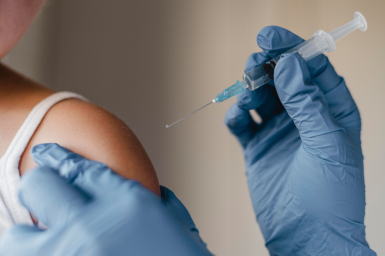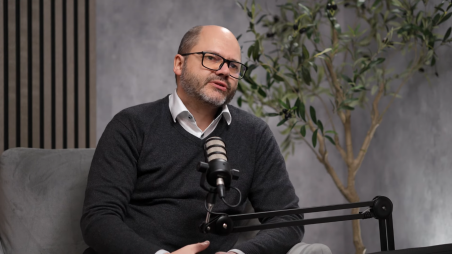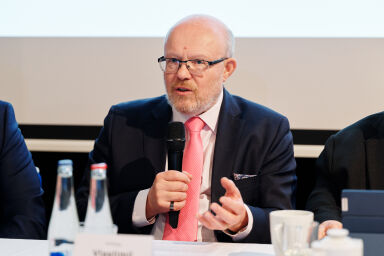„If there was an ideal citizen, we would have nothing to address,“ these words were used to introduce the debate on the promotion of prevention in health policy by the former Minister of Health, former Deputy Prime Minister of the Slovak government and currently MP Richard Raši. He discussed with Czech Health Minister and Deputy Prime Minister Vlastimil Válek and the Director of the General Health Insurance Company Zdeněk Kabátek how to get ordinary citizens with all their weaknesses to try to improve their health. The ways are economic motivation by health insurance companies and reducing health risks of individuals who otherwise cannot get rid of their unhealthy habits. The debate took place as part of the Healthcare Daily’s Economics of Prevention conference.
„If I had made a speech before the elections about people not drinking, smoking and playing sports, we would certainly lose the elections. We all know how to do prevention, but unfortunately we cannot do it in practice yet,“ said Richard Raši at the conference. No one ever questions prevention, and it even appears in the election programmes of political parties. So why is it failing to be promoted? Raši sees several reasons. The main one is political reality. „We have to invest in prevention, it is not cheap, but it is highly effective because the benefits are several times higher than what you put into it. But it has one fundamental flaw: if you want to change the hardest thing, everyone’s lifestyle and behaviour, you won’t see the successes from the work you put in now politically – as a minister or a government. They will be experienced by the next, or even the next political generation,“ Raši explained. The second obstacle to promoting prevention was the preoccupation with acute problems. In Slovakia, he said, there is not enough paediatricians, the emergency room network is collapsing, there is a shortage of common and innovative medicines, and doctors and other health workers are on strike. „Any minister of health has to deal with fires and prevention is once again, although no one will question it, taking a back seat,“ the ex-minister said.

Those who treat their health well will be rewarded
Czech Health Minister and Deputy Prime Minister Vlastimil Válek sees the way to prevention through economic instruments of health insurance companies, but of course also in general support of the government, because it saves on expenses (a healthy insured person draws less care) and increases income (higher work performance of a healthy person increases his social status and the income of him and the government).
The General Health Insurance Company is committed to prevention, and not just in words. „It is true that one dollar invested in prevention results in seven dollars in savings in treating diseases that could have been prevented by effective prevention. I believe it works the same way in crowns,“ said Zdeněk Kabátek, director of the General Health Insurance Company. „The Czech nation is characteristic in that we do not treat ourselves nicely, we drink, smoke, do not play sports, we are fat. However, the Czech nation also has incredibly accessible healthcare, and it is free and in its full scope. The question is whether the first statement is related to the second,“ the director mused, adding that if people are not motivated by responsibility for their own health, they should at least want to save their wallets. But for that, legislation needs to be changed. According to Kabátek, this should allow those who treat the common wallet properly to receive some benefit, such as a reduction in health insurance payments or a bonus from their health insurance company. Minister Válek is currently preparing such legislation and plans to present it to members of both health committees of parliament by the end of the year.

However, the General Health Insurance Company is not waiting idly for the new legislation. „We have prepared a new prevention strategy, we are targeting citizens to explain to them what the use of prevention means for improving their health, what a healthy lifestyle, active movement, sport means. We wanted to draw attention to this with a campaign that stirred emotions. We showed how much it costs to treat a developed disease that could have been prevented at relatively zero cost. The reaction was very contradictory at the beginning, but over time it turned out that we captured the audience’s attention and the negative reactions were significantly fewer than the positive ones,“ said the director of the insurance company. The General Health Insurance Company intends to continue this work. „We now want to show that in the most important areas, such as cardiovascular diseases or diabetes, prevention can bring significant savings for the benefit of the system, i.e. for the benefit of everyone, even those who do not actively use prevention,“ Kabátek added. According to the director of the General Health Insurance Company, effectively implemented prevention of cardiovascular diseases saves up to 4 billion crowns, which shows how huge benefits can be obtained for „little“. The insurance company also wants to enrich the bonuses of insured persons and reward them for regular visits to the general practitioner and active response to calls for screening or detection of serious diseases. The reward will take the form of a contribution to dental hygiene, spa visits, other physical activities, etc. „Thanks to the increase in the prevention fund, we are also able to significantly influence the behaviour of our clients,“ Kabátek concluded.
Reducing risk is the way to go for „non-ideal“ citizens
Richard Raši also pointed out that in the real world, where non-ideal citizens live, we need to talk not only about prevention but also about risk reduction or harm reduction. „Especially with smokers it is not so simple. You can’t ban everything, sometimes you have to choose other approaches that work towards the desired goal,“ he said. Harm reduction-based practices are the basis of public health policy in the UK, partly in the USA, in Sweden, and these policies are successful, as was shown at the conference in some of the presentations by speakers from here and abroad. Why not also take inspiration from them in the heart of Europe? Richard Raši thinks that the hitch lies in „our medical heads and hearts“ and is far from just about smoking. „As doctors, we still have this inner conviction that harmful behaviours like smoking need to be solved by banning them. I myself am an opponent of smoking, a non-smoker in government who was hated by fellow smokers. But in the 15 years I’ve been watching, I see the solution in reducing the risk in heavy smokers. The way of hard bans from one day to the next will not work in our geographical area,“ Raši said, but at the same time stressed that this does not apply to children. „I would be absolutely strict there,“ he said, criticising the easy availability of various flavoured products in vending machines.

„There is no doubt that reducing risks or switching to lower risks is a good way,“ Minister Válek followed his Slovak colleague. At the same time, however, he expressed his wish that other products, just like cigarettes, should become socially unacceptable. „Today, you would hardly find a country where you can light up a cigarette in society, but in the same society, if you light up a pipe or a cigar, it is not a problem. It is not clear to me why this is so,“ the minister fumed. He is also bothered that it is becoming acceptable for someone in society to use cigarette substitutes or chew sachets. According to the minister, there are a lot of young people, especially when it comes to nicotine sachets, who are starting to use these addictive substances „simply because it is less risky“. Here he would welcome a tougher approach. „I don’t mean to ban, but to say clearly – please, there are different habits, you won’t prevent their use, but it’s not socially right, they should be somewhere on the fringes. And I would expect the same thing to happen with alcohol, the drinking of which is very much socially accepted. Nowadays, films are made where there is no more smoking, but James Bond will still be drinking martinis,“ the minister sighed.
According to Válek, the need to protect children and adolescents stems from a medical nature. „The receptor theory applies to addictive substances. The higher risk of addiction to a substance lasts until about age 25, when the brain is developing. Zero tolerance by the age of 18 or 20 should be really crucial. As one gets older, the risk of succumbing to an addictive substance to the point of becoming dependent on it drops sharply. If someone encounters alcohol in their 30s or 35s, the risk of becoming addicted is much lower. I am not talking about the risk of the substance, but the risk of addiction,“ said Minister Válek. The moderator of the conference pointed out that it is necessary to separate the issue of children and adolescents from adult smokers, and that convincing data on the success of health policies based on harm reduction were presented directly at the conference, and even that preliminary data in the Czech Republic suggest an acceleration of the decline in smoking rates after the introduction of alternative products on the market: „You are absolutely right,“ the minister responded, adding: „Alternatives are a wonderful route for many smokers who are unable to quit and are thus getting fewer and less risky options.“ However, Válek pointed to the lack of data on the effect of nicotine sachets, where „undoubtedly there will be some effect on the coronary arteries“.
„The less harmful alternative is a way for long-term addiction in adults, but it cannot become a way for minors to start using the habit in the first place,“ his Slovak counterpart said.

EU: Differentiated taxes and child protection
An EU-wide approach could help overcome some of the pitfalls of prevention that are not being enforced at national level. „The EU can push employers to ensure that the various programmes they offer pay much more for prevention programmes and that there are breaks for employees to do sport and time off. This has been common in the United States or Japan for decades. But healthcare is not a shared policy,“ Minister Válek outlined. He and other departmental ministers from several European countries have been pushing to strengthen screening programs so that if someone works first in one country, they can continue screening in another. „The European Union supports oncology, for example, or mental health, but there is a lack of a big prevention programme, and that is a mistake,“ he said.
The Slovak ex-minister and MP Richard Raši would like to see money from the EU funds allocated for prevention programmes (support for screening, support for risk reduction), which could be professionally and financially managed from Brussels, which would bridge the gap at national level, where there is always a higher priority than prevention. „Then there are the tax issues, there is the consideration of how to tax the most harmful and whether to favour what is less harmful. This could also be done centrally by the European Union. Equally, we should agree at a central European level that addictive flavoured products should not be available to children in vending machines. We must protect minors. We must not make the mistake of putting on the market, as part of harm reduction, a product that a heavy smoker will never use, but our children will use and will eventually start smoking. That is where we need to be cautious,“ concluded Richard Raši.
Mohlo by vás zajímat
Tomáš Cikrt
Photo by Radek Čepelák
We would like to thank the General Health Insurance Company, National Sports Agency, RBP, Health Insurance Company of the Ministry of Interior of the Czech Republic, Military Health Insurance Company, EUC Medical Group and Sprinx for their support of the conference.











